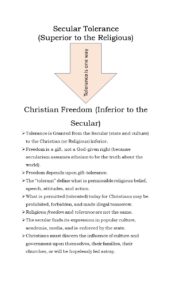Holyoake’s 1896 publication English Secularism defines secularism thus:
Secularism is a code of duty pertaining to this life, founded on considerations purely human, and intended mainly for those who find theology indefinite or inadequate, unreliable or unbelievable. Its essential principles are three: (1) The improvement of this life by material means. (2) That science is the available Providence of man. (3) That it is good to do good. Whether there be other good or not, the good of the present life is good, and it is good to seek that good.
Define Tolerance as it is expressed today.
1. Tolerance is always from a superior to an inferior
2. Tolerance speaks of “giving rights” to others, rather than understanding rights are not one’s to give, but to acknowledge
3. Tolerance is changing
4. Tolerance by nature limits Christian expression
5. Tolerance is a myth, a smokescreen to hide opposition to religion and to place limits upon it.
Define Freedom
1. Freedom is independent from the state
2. Freedom is enjoyed, but may be removed by the government
3. Freedom is not a Condition for the operation of the Christian Faith
a.Christians under Nero were not free
b.Christian in many persecuted lands are not free
c.Real freedom comes only from Christ –John 8:32, 33
d.Christians are obligated to be faithful in spite of freedom or bondage
Are they the same?
1. Tolerance often is advanced as kindness or patience, and this is good–but it is not the idea behind tolerance.
2. No serious Christian is arguing for the right to be mean and cruel, but the definition of what is acceptable speech and behaviour is not up to the culture.

1. “Jesus is the only way to God.” (Acts 4:12; John 14:6). Is this tolerant or intolerant? Can someone say this without meaning harm to those of other religions? Why or why not?
2. Is disagreeing with someone necessarily harmful to them?
3. Is it possible to believe that your beliefs are true only?
4. “I believe that all religions are equally true.” Is that a tolerant statement? Does this view really tolerate all other views?
5. How does Acts 5:29 fit with tolerance?
